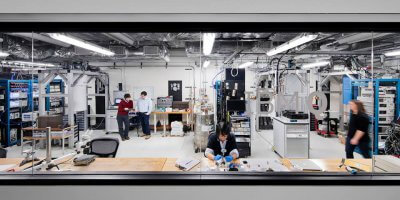
Australia’s GDP is what companies will spend on buying technology this year. Source: Shutterstock
Global spending on digital transformation to equal Australia GDP
DIGITAL transformation is a capital intensive project. It’s something businesses have been talking about for quite a while and spent the better part of 2018 exploring, discussing, and strategizing about.
To be fair, some of the biggest companies in the world have already started investing in digital transformation projects — take Nestle, Henkel, and Burberry for example.
The three are as diverse as one can get but all of them have made significant investments in technology, proven by ample disclosures in their annual reports in previous financial years.
This year, however, is going to be a big year. According to new forecasts by IDC, global spending on digital transformation to equal US$1.18 trillion in 2019 — which is almost equal to the GDP of countries such as Australia and Indonesia.
IDC’s analysts believe that an increase of about 17.9 percent over last year’s spending forecast is a good estimate of what’s to come this year, pointing out that there’s plenty to be excited about when it comes to new technologies in the world of business.
If this wasn’t exciting enough, IDC’s Customer Insights & Analysis Program VP Eileen Smith forecasts that worldwide digital transformation technology investments are expected to total more than US$6 trillion over the next four years.
“Strong DX technology investment growth is forecast across all sectors, ranging between 15 percent and 20 percent, with the financial sector forecast to be the fastest with a compound annual growth rate (CAGR) of 20.4 percent between 2017 and 2022.”
Manufacturers, not banks, are leading digital transformation spending
Banks (and insurance) companies — traditional players in the financial services space — are often accused of relying on legacy infrastructure and getting comfortable with their decades-old systems.
They’re also often seen using technology on the surface, creating modern applications for customer-facing functions but not for internal use.
The expectation, therefore, would be that banks will lead the rapid growth in spending on digital transformation. But that’s not true.
According to IDC’s estimate, the two industries that will invest the most in digital transformation in 2019 are discrete manufacturing (US$221.6 billion) and process manufacturing (US$124.5 billion).
For both industries, the top digital transformation spending priority is smart manufacturing, supported by significant investments in autonomic operations, manufacturing operations, and quality.
Retail will be the next largest industry in 2019, followed closely by transportation and professional services.
Each of these industries will be pursuing a different mix of strategic priorities, from omnichannel commerce for the retail industry to digital supply chain optimization in the transportation industry and facility management – transforming workspace in professional services.
That raises the question — what does this mean for banks and the financial services industry in general?
To be honest, spending isn’t any indication that banks aren’t sufficiently investing in technology to prepare for the future.
In the case of banks, the spends are relatively low when it comes to digital transformation because deployments are primarily software based and require an overhaul of internal “core-banking” systems.
Further, with the increased scrutiny on banks from regulators with regards to open-banking, privacy, and cybersecurity, customers can rest assured that their institutions are doing what’s necessary to protect their interests.
What’s inside the digital transformation technology pack?
Recently, consulting giant Accenture said that the pioneers of tomorrow’s digital world will not just use technology intelligently but they’ll use one technology in conjunction with another to complement each other.
“Future-minded leaders know that they will need not only every digital tool in their current arsenal to succeed, they’ll also need new ones. The next set of technologies every company will need to master? Distributed Ledger Technology (DLT), Artificial Intelligence (AI), Extended Reality (XR) and Quantum Computing,” said Accenture’s report.
Those four technologies make up DARQ technologies, and according to the think tank, will help tomorrow’s businesses gain an edge over those that climb the digital maturity curve as we know it today.
However, when it comes to spending, IDC’s forecast suggests that companies are still investing primarily in building their foundations in technology.
The digital transformation use cases that will see the largest investment across all industries this year, according to IDC, will be autonomic operations (US$52 billion), robotic manufacturing (US$45 billion), freight management (US$41 billion), and root cause analysis (US$35 billion).
Other use cases that will see investments in excess of US$20 billion this year include self-healing assets and augmented maintenance, intelligent and predictive grid management for electricity, and quality and compliance.
The use cases that will experience the greatest spending growth over the 2018-2022 forecast period are virtualized labs (108.6 percent CAGR), digital visualization (53.5 percent CAGR), and augmented design management (43.9 percent CAGR).
Overall, IDC’s forecast makes one point very clear — companies across the world are fine-tuning their focus on technology and will do everything they can to make sure they deliver on customer’s (and stakeholder’s) expectations in the coming year.
“It is already clear from our research that the businesses which have invested heavily in digital transformation over the last 2-3 years are already reaping the rewards in terms of faster revenue growth and stronger net profits compared to businesses lagging in digital transformation initiatives and investments,” said IDC Customer Insights & Analysis Group Research Manager Craig Simpson.
READ MORE
- The criticality of endpoint management in cybersecurity and operations
- Ethical AI: The renewed importance of safeguarding data and customer privacy in Generative AI applications
- How Japan balances AI-driven opportunities with cybersecurity needs
- Deploying SASE: Benchmarking your approach
- Insurance everywhere all at once: the digital transformation of the APAC insurance industry










